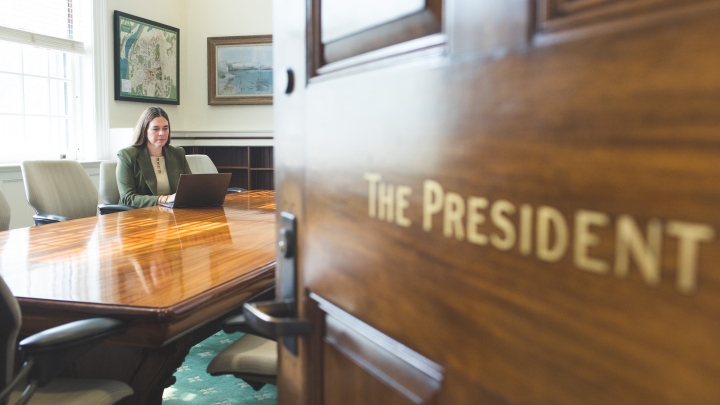
No one, especially not Beilock herself, could have expected such a wild start to a college presidency.
When most students returned to campus last September, President Sian Beilock gave them a grand introduction. Her inauguration ceremony on the Green—despite its puny undergraduate attendance and enthusiasm—made us think that improvements galore were on the horizon. Certainly, such grandiosity befits an inauguration speech. We can expect that a potential Harris one in January, for example, will claim to solve racism and poverty. Beilock, at any rate, set the expectations high for herself.
She had little time to wallow in this honeymoon period. Her inauguration was on September 22. Just over a month later, she faced her first test. On October 22, two students were arrested for trespassing on Parkhurst Hall’s lawn while obtusely promoting the Dartmouth New Deal, a demand so extensive and comprehensive that it could make any congressional omnibus bill shutter.
Beilock’s decision to have the recalcitrant activists arrested, while completely warranted, engendered a wave of discontent among those suddenly concerned with freedom of expression. Surely, by this point, Beilock recognized that she was no longer in a cushy academic post. Nor could she have expected to ride through the Dartmouth presidency simply taking fundraising trips and smiling on camera. Even more tough decisions would await her.
In February, Dartmouth became the first Ivy League institution to reinstate the SAT requirement for its applicants. With the pandemic behind us at that point, a few professors set out to consider the worth of standardized testing. Their verdict? The scores can be an excellent predictor of college success. Shocking. Beilock made the bold decision to bring mandatory testing back, and other institutions followed. On that issue, we can certainly claim that Beilock led.
Her SAT decision, again, was not met without resistance. The activists returned with their accusations of hate, suggesting that eliminating the test-optional policy would marginalize minorities and low-income students. Support groups were held. By that point in the year, Beilock, the widely-celebrated first female president of Dartmouth, was far from the progressive darling that she could have been.
Make no mistake, Beilock has still paraded out a plethora of initiatives leftist students should be praising. She has made addressing emissions a top priority. She has committed to mental health improvements. Housing shortages have been addressed, on paper at least, but without any material successes to boast just yet. Diversity measures remain as omnipresent as we should expect from higher education. None of this matters, though, when she fails to capitulate to every demand from the WGSS majors.
Ever since May 1, when 89 pro-Palestine protesters were arrested on the Green while knowingly and intentionally violating the administration’s reasonable warnings, Beilock has become as hated by the mob as any Republican who dares to visit campus. She is a “fascist dictator.” Such delusions prompted a meaningless vote of no-confidence among the student body, which barely passed.
She weathered that May storm until early July, when another test presented itself. Won Jang ’26 tragically died in the Connecticut River during a gathering that is now being investigated for hazing. Beilock’s response, I have to say, was distant and inadequate. Dean Scott Brown, who has since left his post, was the face of the administration’s response. For an event as shocking and heartbreaking as it was, Beilock certainly should have been more present. It was, in my view, her worst moment as president to date.
Her response to the protests throughout the year, though, places her among the Ivy League’s best. While others at Penn, Harvard, and elsewhere were letting maniacal students tear their campuses down, Beilock stepped in and put the students in their place. She has shown no hesitancy to act with backbone when necessary. Harvard’s Claudine Gay, Penn’s Liz Magill, and Columbia’s Minouche Shafik weren’t so deliberate, and have since paid for their miscalculations.
Suffice it to say, Beilock is now the leftist students’ worst enemy. She garners more hate than anyone on that insane online soapbox we call Fizz. Still, I would guess that her approval ratings remain relatively high—not among the too-numerous radicals, obviously, but among us rational students wanting a stable campus. To read more about the divide between protestors and ordinary people, James Eiler’s article in this issue about protests is a good starting point.
If we must assess Beilock’s first year as president, we extend generally positive judgment. She has navigated pressures few in her profession could expect in just one year. She has prioritized authentic free speech, and rejected violent and inflammatory acts of rebellion. She has, for the most part, kept her nose out of Greek Life and allowed traditions to persist. Her administration’s decision to suspend Beta and APhi for Jang’s death was absolutely warranted. She has brought Dartmouth closer to academic rigor by reinstating the SAT requirement. She has kept Dartmouth stable at a time when the rest of the Ivy League is in the madhouse. No, she hasn’t been perfect, but she has manifested the resolve and independence requisite for the job. We at The Review have not lost confidence in her just yet.

Be the first to comment on "President Beilock’s First Year in Review"